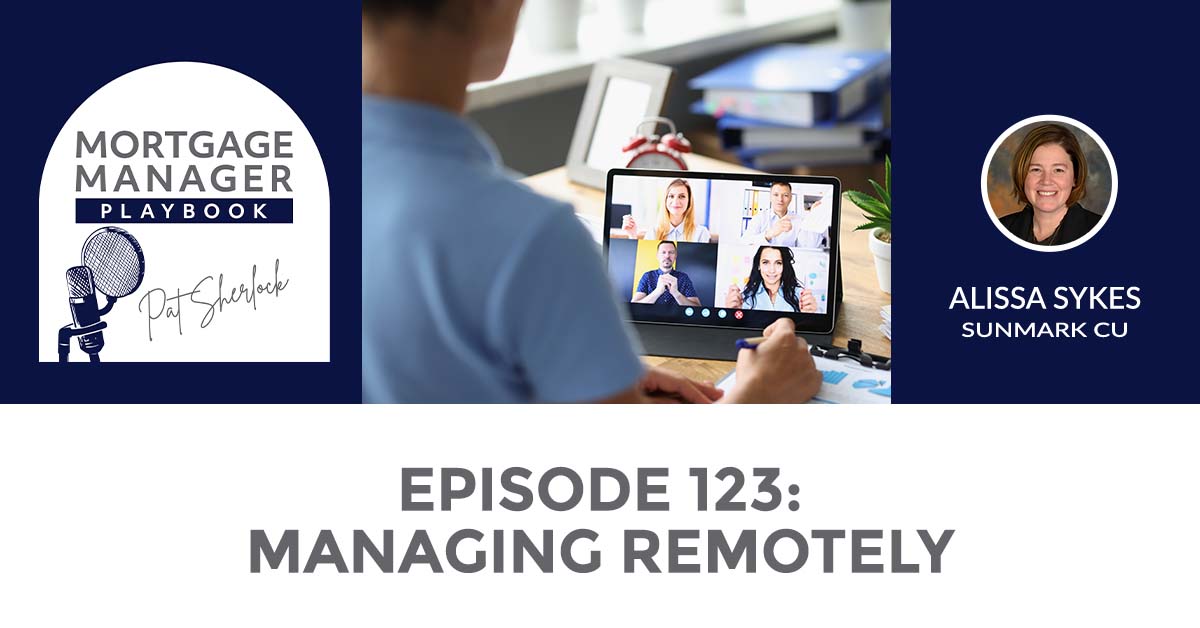
Alissa Sykes, the Sr. VP and Chief Growth Officer at Sunmark CU, discusses managing remotely.
Highlights include:
- Employee check-ins;
- Online fun-hangout;
- Little things matter;
- Never stop learning and be a mentor.
Listen to Alissa talk about this very timely topic for today’s environment.
—
Managing Remotely With Alissa Sykes
Our topic is managing remotely. Our expert is Alissa Sykes who is SVP and Chief Growth Officer at Sunmark Federal Credit Union. Prior to Sunmark, Alissa was with TD Bank and started as a loan originator. This is such an important topic and so timely, but before we jump into it, why don’t we talk about how you get into managing? Talk a little bit about that.
When I first got out of high school, I knew that I wanted to be in the financial industry. When I was going to college, I started working as a teller, which is a great experience. It gave me a solid foundation. I moved quickly. By the time I was nineteen, I became a branch manager on the retail side. A local bank gave me a lot of experience overall at a very young age. I was managing people twice my age. That was an interesting dynamic but it was the solid foundation I needed to get me where I am. I appreciated that retail experience and also managing at a young age.
You knew when you were young what you wanted to do. That’s terrific. What was the best advice you got? It seems like you were managing certainly people older than you. What was the best advice in your opinion?
I look back. It was always instilled in me to never stop learning. At the end of the day, whatever job you have, you need to focus on the next job. I would learn whatever I needed to learn in my current role to become an expert in it but then I didn’t stop. I kept evolving into what the next role would be. When I was a teller, I was looking at what the head teller was doing and offering up, “Let me help you. Let me go ahead and assist with anything you need to do so that I would learn it.” If the role became open, I was able to say I had the skills. I always focused on the next stage of my development or career. I never got fully satisfied with the current role I was in. I always wanted to learn more and progress further in my roles.
That raises a good point. Would you read books on topics? Talk about how you learned this from observing.
I had a good role model. My mother and my father were very hard workers. They were middle class. They worked hard. I watched them. They instilled a work ethic in me. As I became older, I had very good mentors as teachers. I did some job shadowing at some local banks. That’s how I knew I wanted to be in that field. When I got there, it was easy. You had materials, books, and people who had been in the industry for a long time that would mentor you. They were willing to help you engage and let you help probably more times than not.
I don’t want to be negative but a lot of times, people would welcome you doing their job. I always took advantage of that and never let it discourage me. A lot of people can get frustrated with taking on someone else’s work. I looked at it as an opportunity and dug in. They allowed me to do it. I was going to school for accounting and working. It was an interesting time for me but it helped me grow. Far too often, people are worried, “That’s not my job.” Does it matter? You’re going to learn something that’s going to propel you forward in the next.
Many people can get frustrated with taking on someone else's work instead of looking at it as an opportunity to help them grow and learn something that will propel them forward. Share on XThat’s what I try to tell all my employees now. I use whatever is available to me. I read articles and newsletters. At that time, there weren’t a lot of the podcasts and such that are out there now but I used every tool that was available to me. At that time, they had a lot of coursework that you could do. The American Institute of Banking had classes that I would take. I took advantage of whatever was out there.
Would you go up to the individual that became your mentor? Did you ask them? Talk about that.
I would always take it from the side, “I want to know what you do. I want to learn it. My aspiration is to be a leader in this industry. Tell me how you got here.” I formulated a relationship with them in such a way that they wanted to help me progress in my career. It was challenging when I was a lot younger but they were never threatened by me. They were always very open and willing.
They took me under their wing in many aspects of it. The key to it is that you’re not threatening. You’re there to learn. People were open and responsive to it. They wanted to help me, which was nice and give me their knowledge. I was there willing and eager to take it. I do think that has a lot to do with it. If you’re willing and open, and there’s a greater cause there, they’re willing to do it.
The first step is to ask them. That’s terrific that you did that because sometimes individuals expect the mentor to ask them. It doesn’t work like that. That’s a great point. You’ve been managing all types of people for many years. What do you think is the secret sauce that people miss?
Honestly, it’s so simple. I’m not going to tell anyone here anything that they haven’t heard before but listening and overall communication are so important. What ends up happening is a lot of leaders end up believing they have communicated it. I will have a team meeting and communicate in a fashion that’s very generalized. As you get to know your employees, I know with each direct report that I have how I have to then curtail the next conversation so that they understand it.
Understanding how they communicate is key. There are some that I know that as soon as I get off that team call, I better follow up quickly on a quick two-minute call to make sure that they understand the direction because they may be very literal. They hang on every word you say, which always isn’t the intent but that’s how they work. It’s getting to know them and their behaviors and then making sure that you are accommodating to them to make sure that they understand what your direction is and what your end goal is and that we’re all on the same page.
Far too often, people give a directive. Everyone is expected to know what to do. That’s it. If they don’t do it, there’s a failure in it but then you’re blaming that failure on the person. Generally speaking, it has been the communication initially that failed. I over-communicate in those situations so that I know that everyone is clear. The longer you work with someone, the more you get to know how they receive information. I work hard on that.

Managing Remotely: The longer you work with someone, the more you know how they receive information.
That’s a good point because I don’t think enough managers recognize that there are three primary learning styles. What I see is that leaders sometimes send out an email and think that’s enough. Some people that are auditory need to hear it. Those that are kinesthetic are individuals that need to do something and need to feel the component of it. You have raised a good point. I’m glad that you have because I do think sending an email out does not change and doesn’t instill what you’re trying to do. When you talk about a key practice that you keep coming back to, what is it that you see? You’ve managed people younger, older, and the whole bit. Talk about that.
At all levels, it’s coaching. I’m a huge believer in coaching your employees. I have twelve direct reports. I immediately coach every single one. I give an hour a month dedicated to solely career coaching. I have check-ins. We check in weekly. Those check-ins are one-on-one. They’re quick and easy, “What’s going on? What do you need? What obstacles can I remove?” That’s more day-to-day business. The hour that we spend every month is coaching on career growth, development growth, and overall strategy.
I find that is what helps me manage all different levels. I have vice presidents and AVPs that report to me. I even have a couple of managers who report to me because of the situational overall org chart. I’ve had all not just age appropriations reporting to me but also skill level, yet I have to make sure that I can pivot with them on what is going on and what we need from them in the organization.
I use that communication and those coaching sessions. Generally, I always say, “I learn more out of those meetings than I feel like they do,” but it’s the key component of managing, especially remote. I always do them on a visual Skype type of setting so that we can see each other and each other’s body language to make it much more personal.
One of the issues with working remotely that I have found is what you can lose quickly is your culture. What makes our organization great and why we want people to work for us is our culture. We make it fun and engaging. We want people to learn and grow. That can be easily lost in a home environment because you can feel very isolated and alone. I make sure that during those one-on-ones, I am engaging. You’re asking how their family is. You’re getting more than, “This project needs to be done by next week. Where are you at with it?”
What makes an organization great is having a culture that makes it fun and engaging, and people can learn and grow. Share on XYou need to make sure that it’s all-encompassing about this person’s career life. You’re inserting yourself as a leader, whether you’re the role model or manager. They can come to you to help remove those obstacles and assist you with anything that they’ve got going on. They have a commitment to you there that’s so strong. It helps when you are in this environment. What I hear more than not is that it can be lonely, especially in task-based work. I make a great point to do a lot of team activities as well as individual one-on-one.
You started to briefly talk about managing remotely. The current view is that the employees love it. I talk to a lot of lenders. That’s certainly what I’m hearing from them but you have raised the issue of how they might like it. Productivity has been high from what lenders are saying. They were all surprised about that but it does raise this issue. It’s not for everybody. A lot of employees love it, and that’s the feedback but there are others that don’t. This is the other issue of how you maintain culture to make you look different from another lender.
Before this happened, we were very much a hybrid shop. Our mortgage division has about 40 employees in it. We took it as we were a workforce that allowed us to be hybrid. You could come and go. You dress for your day. You’re in the office if you had any in-person meetings. We allowed all of our ops to come in and out. We had staggered start times. We were flexible with our staff. It ended up working out. Fifty percent of them would come in at 10:00. Fifty percent of them would come out at 7:00 in the morning.
It ended up staggering. We had people in the office. It created a good environment. We had happy hours on Fridays or whatnot. We would have staff meetings, birthday lunches, and all those things that create your culture. We came to the pandemic and went 100% remote. We were ready from a technology standpoint but we weren’t ready from the culture because when we were in the office, we ended up letting the culture drive it.
We made a conscious effort to start creating some online fun. We created hangouts. During all this, everybody knows we’re in a refi boom. Everyone is stressed out but you’re right. Going home increased our production. In the months of April to June, even though things were shutting down, we had our best closing months because everyone was dialed in and working more efficiently without a lot of interruptions.
What we wanted to do though is to make sure people’s mental health was good and that our culture was. We did a few things with marketing where we created some hangouts where maybe for twenty minutes, you could pop into a zoom meeting. The topics varied. The topic could be, “What is the best Netflix show out that you’re binge-watching?” The next one would be, “What is your best hobby? Do you sew? What kind of music?” They wanted to break into what type of music they liked.
It was interesting. It became engaging for our staff. It was a quick 15 to 20-minute break yet you still saw your peers. We held virtual happy hours where we normally would have our Friday night at a local pub. We did it virtually. It was fun because what it did was it allowed us to see the people’s families. The connection that you had with seeing their families helped.
At the entire credit union, we used a company called Qualtrics. They’re an experience company that helps you with your member experience but they also help you with your employee experience. We started doing a lot of surveys asking how they feel, what they are looking for, and what they are missing. We tailored whatever we were doing from a marketing HR perspective to that information. We had direct information from our employees to find out what to do.
That’s where all these things came up. They would give the topic every single day. At this point, we have an internal internet. It will be the topic of the day. It was apparently Egg Day. Everybody wrote about what is their favorite egg, “How do you cook it?” They shared recipes. It can be as silly or corny as that. We had a day, “Show us a picture of your work environment.” Everyone in the company would post a picture of their new work environment.
It’s fun and engaging. Little things like that go a long way. It has helped us stay connected and informed. Going back to how communication is key, we also make sure that we put anything that’s changing or developing out on that employee portal for communication. It’s being used far more now than it ever was in the past. We had it there. It wasn’t engaging. They do these silly daily contests. If you would want to stay there, it’s much more engaging. People loved it.

Managing Remotely: Communication is key. Make sure you put anything that’s changing or developing out on the employee portal for communication.
For the people that report to me that are struggling with being home, we’re working on a come-back-to-work policy. That is going to look like a hybrid option because we do think that people not full-time but at least a couple of days a week are more productive when they work from home. We have all the tools we need to manage from home. We are going to look at changing that environment even as we come back. I don’t think you will ever see us come back in the capacity that we were going into this pandemic. We have learned too much. People want a different lifestyle too. This is accommodating to that. We see a lot more positives than we do negatives.
You’ve had great ideas. I could talk for hours about this, but we need to give some takeaways that you would recommend for people listening.
The number one takeaway is to not forget about your culture. It’s easy to make that simple statement. You’re never going to go wrong with communicating, over-communicating, and doing check-ins with your employees, but it’s trying to keep an engaged and satisfied employee. You made a comment earlier that the competition now is going to be even fiercer than it was.
We all struggle with recruiting in our business. It’s going to be easier for companies because there is this remote option to keep your employees satisfied and engaged. Little things go a long way. Make sure you don’t lose sight of your culture, make it fun, and continue to be engaging even when you’re stressed out with this refi boom. Make sure you make it a priority that your employees are healthy, happy, and engaged with your company.
Make it a priority that your employees are healthy, happy, and engaged with your company. Share on XThat’s the ticket to success for sure. I want to thank you for sharing your wisdom and a lot of great ideas. I want to thank our readers too. Thanks so much.




